In 2011, music wasn’t as great as it could have been. You can name a bunch of good singles, but hardly any good albums. There wasn’t an egomaniacal masterpiece to even out the mediocrity.
Dubstep and chillwave gained widespread popularity, despite essentially being music without real instruments. But there were still things to be thankful for. There are now bands with members young enough to be grunge-revivalists. Women singers took to the fore like never before, ruling the roost in almost all genres. Hip-hop’s new blood has made it more exciting than the genre has been since the ’90s. R&B found new audiences, new artists, new demographics, and new collaborators. These may be silver linings on a largely grey cloud, but damned if the lines aren’t sparkling, bold silver. Here are 10 good reasons why you shouldn’t be jaded with music just yet.
Frank Ocean
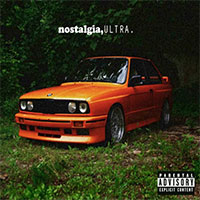
Nostalgia, Ultra.
These days, you can’t discuss hip-hop without a mention of Odd Future, a group of gory kids in their late teens that rap brazenly about rape, murder, and misogynistic fantasies (to name a few alarms). A quiet 23-year-old R&B singer who has penned songs for Beyoncé and Bieber is the last thing you’d expect Odd Future to embrace as their own, but, as Nostalgia, Ultra shows, Frank Ocean is full of surprises.
Surprise: his chocolate-smooth voice croons dreamily over an unexpected sample of Coldplay’s ‘Strawberry Swing’. Surprise: at the end of each song, he has painstakingly added authentic cassette recorder start/stop sounds, making Nostalgia, Ultra the closest thing to a real mixtape in at least a decade. Surprise: on ‘Nature Feels’, he reworks MGMT’s ‘Electric Feel’ into a bona fide sex serenade (“I’m feeling like Adam when he first found out this existed / Uhh, wow”).
More surprises: ‘Novocane’ details the story of a dentist/porn actress with whom Ocean supposedly shared a bong at Coachella. ‘Swim Good’ is about merciless suicide, achieved by driving his car into the sea. On ‘American Wedding’, which features the greatest sampling ever of the Eagles’s ‘Hotel California’, Ocean bemoans the triviality of Western love (“It’s just an American wedding / They don’t mean too much”).
There’s no use getting into the details, really: every song on this record is so flawless and fresh that one can only gush. Released as a free Internet mixtape because of a record-label brawl, Nostalgia, Ultra comes into the world almost perfectly formed. Exciting, astonishing, polished, intelligent, and funny, this is the record that startles you into multiple, immediate replays of each song. If you’re going to listen to only one album this year, make it this one.
Notable songs: ‘Strawberry Swing’, ‘Novacane’, ‘American Wedding’, ‘Nature Feels’, ‘Dust’.
Yuck
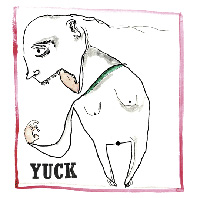
Yuck.
Fifteen-year-olds London boys Daniel Blumberg and Max Bloom, along with a couple of their schoolmates, got together in 2005 as Cajun Dance Party, a band that achieved reasonable N.M.E. success. Following the demise of said band, the two British lads then got together with New Jersey drummer Jonny Rogoff and Japanese bassist Mariko Roi, to revive American grunge and alt-rock as Yuck. Globalisation is a wonderful thing, innit?
And of course, contrary to their name, the band is anything but distasteful. A few seconds’s sample from any song will evoke distilled fuzz and suburban wastelands faster than you can say ‘nostalgia boner’, and it only gets better from there. While it is not rare to see grunge/noise pop revivals cropping up occasionally (No Age, Wavves, and Japandroids are but a few), it’s clear that Yuck really owns the arena. Wigged-out guitar crunch and teenaged dreams pay homage to the Pixies on ‘Holing Out’, and the pop perfection of ‘Suicide Policeman’ envelopes you in a haze of Teenage-Fanclub-reminiscence. It is on the behemoth ‘Rubber’, though, that Yuck shows us what they’ve got. Muddled, disaffected Pavement-esque guitars hide behind walls of sound lined with Sonic Youth, as Daniel Blumberg channels Cobain’s blurry melancholia into the greatest ’90s-mixtape-in-one-song that you will ever hear. It’s curious that Yuck’s members were babies when these artists were getting kids everywhere to start their own bands. It’s curious, still, that none of them grew up anywhere near the musical hotbeds that they so deftly emulate. Frankly, however, as long as they keep doing whatever they’re doing, it really doesn’t matter.
Notable songs: ‘Rubber’, ‘Suicide Policeman’, ‘Operation’.
Adele

21.
From the moment the staccato drums kick in on ‘Rolling in the Deep’ to the moment the last echoes of the piano fade away on ‘Someone Like You’, 21 will have you absolutely, spellbindingly riveted. Borne out of a heart-wrenching break-up of a long relationship, this monumental record from Tottenham, London native Adele Adkins has managed to outshine her awe-inspiring debut 19 (2008), making it the year’s top-selling record, and for good reason.
With 21, Adele accomplishes the blue moon of the music industry: an album that touches and impresses anyone who listens to it, biker dude or cookie-cutter wife, tween or grandmother, show-tune hummer or hip-hop enthusiast, music critic, or your mother. The secret to her massive success is, of course, also the aspect that is most readily apparent: that voice. It roars, transcends, touches a falsetto, reaches a dusky low, swerves, plods, whispers, and bellows: often within the same song. Lyrically, the album starts with fierce independence and moves masterfully though anger, retribution, distress, and eventually bittersweet helplessness—mimicking what everyone all over the world goes through after a painful break-up. And this is the crux of why Adele’s 21 became such a monstrous world-wide hit: the universality of her music. As if her glorious voice were not enough, it just so happens that Adele possesses a devastating skill for writing lyrics that are common enough to be applicable to everyone, and poetic enough to catapult her to stupendous fame.
Notable songs: ‘Rolling in the Deep’, ‘Someone Like You’, ‘He Won’t Go’.
Atlas Sound

Parallax.
Anyone who is acquainted with the Deerhunter/Atlas Sound universe should be familiar with singer Bradford Cox’s infamous inner dilemmas, manifested usually as outward melancholia and diffused, buried vocals. But this fuzzy, elusive persona is no more on his third album, as Bradford Cox shows off a penchant for pop hooks and songwriting that you never thought he’d have. What’s even better, he manages to combine this newly-discovered skill with his established talent of making gossamer-silky dream-gloom pieces of mood music. For example, ‘Te Amo’ glides like tropical fish through a coral reef; and as the song unfurls slowly into a veritable hook, the music’s so wondrous that you hardly realise that he’s singing about melancholy again (“When you’re down, you’re always down,” goes the refrain). ‘Mona Lisa’ has the jangle and delicate beauty of an early-’50s record. ‘Terra Incognito’ spiritually chimes in with Halcyon Digest’s ‘Sailing’, albeit with an actual hook this time, however fragile it may be. Listening to Parallax is like someone putting a tiny, newborn baby in your hands at the precise moment when you’re so weary of the world that you decide to end it all. Parallax is the best thing that Bradford Cox has done as Atlas Sound. You really should listen to this album.
Notable songs: ‘Te Amo’, ‘Mona Lisa’, ‘Lightworks’.
Saigon
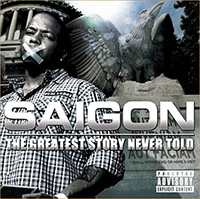
The Greatest Story Never Told.
In early 2000, 22-year-old Brian Carenard stepped out of prison, having done his time for a bar fight that got a little out of hand. Vowing to put to practice the self-discovery he’d acquired in the clink, he started putting out mixtapes immediately, aiming eventually to create enough buzz to land himself a record album that would tell his story—and much to his joy, Brian soon signed a deal with the legendary Atlantic Records. But, as fate—and cliché—would have it, the record label tried to pressurise the resolute rapper into radio-friendly collaborations and the kind of rap material that even Shawty Mane can top.
Extricating himself from the Atlantic mess, Brian continued to create underground buzz solely on the basis of his enormous talent, gracing numerous magazine covers and even the small screen, playing himself on Entourage. Fast forward to 2011: Brian Carenard, now known ubiquitously by the single moniker Saigon, releases his much-awaited debut album and, true to his precocious boasts, it may well be one of the best rap albums of this generation. Slick beats, smart rhymes, sharp production, and the kind of raw emotions of regret and recovery that are rarely, if ever, done right—Saigon delivers as promised.
He’s seen a lot in his life—the headiness of youth and the regret that follows; frustration that pales into disappointment; and the liberating closure of redemption. Amazingly enough, he’s managed to fit all that, and more, into the 17 tracks on this album. And that, frankly, is the greatest story never told.
Notable songs: ‘The Invitation’, ‘Clap’, ‘Come On Baby’.
The Strokes
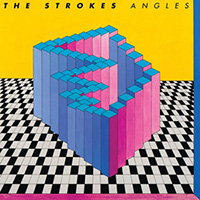
Angles.
At the core of it, the Strokes face one true problem: their debut album was too perfect. The first eleven songs that they released as a band happened to be so meticulously crafted, so flawlessly structured, so impressively nonchalant, that no one could envision any improvement in their sound. The two consequent albums saw the Strokes clearly suffering from this conundrum: in order to be better, they must change their sound; if they changed their sound, they would lose who they were.
Angles, unlike Room on Fire and First Impressions of Earth, offers much of that effortless, clean, quintessentially Strokes sound, in stronger doses than ever, in fact—the choruses are bouncier, the basslines are more confident, guitarist Nick Valensi’s skills are niftier, and Julian’s voice is noticeably less morphed. However, instead of reluctantly settling for a mere remake of their debut, the Strokes have smartly decided that, this time, they were going to revamp it—by becoming a part-time ’80s revivalist band. ‘Machu Pichu’ (which has nothing to do with Incans) sprinkles copious ’80s reggae into the offhand Manhattan gait, while the droning synths and Casablancas whine on ‘Games’ sounds like Madonna and Men at Work had a quirky baby in New York.
By the time it hits the chorus, ‘Taken for a Fool’ struts its way into the kind of laidback rhythm that made you fall in love with the Strokes in the first place. Sure, these songs won’t change your life or musical outlook quite like ‘Hard to Explain’ or ‘Last Nite’ did. But they’ve got that Strokes sound like nothing else since Is This It?—by any band, Strokes or Strokes-influenced. Ten years ago, the Strokes released Is This It?, a truly perfect indie rock record that inspired countless kids in countless garages around the world to start their own bands. With Angles, the N.Y.C. quintet proves, once and for all, that no one does the Strokes better than the Strokes.
(tl;dr: The Strokes are back!)
Notable songs: ‘Machu Pichu’, ‘Taken for a Fool’, ‘Under Cover of Darkness’.
The Weeknd
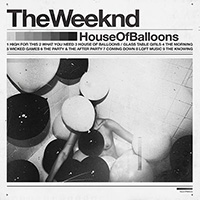
House of Balloons.
As I said in the beginning of this list, 2011 in music has been rather bland, largely unoriginal, and not really that exciting. Thankfully, there’s one important segment that has shined fiercely this year: underground R&B, riding on the coattails of startling talents like Frank Ocean, jj, and Beach House. The Weeknd’s House of Balloons, an apathetic electronic record with surprisingly still-wounded gashes of humanity, is a fine, fine addition to this elite club of R&B revivers. Unlike most urban R&B albums, House of Balloons talks enough about the decadent, bacchanalian Manhattan loft parties, but also about the heart-shattering illness of the soul that follows—and in that way, the album title makes perfect sense. This is a record that subtly, discreetly talks about the flip side of untethered freedom: crushing loneliness, permanent bruising of the spirit, and an inability to fulfill the primitive need for an emotional home. Drugged, dazed, confused, and weighty, this is the kind of food for thought that comes along rarely nowadays. Of the many R&B offerings that 2011 has given us this year, The Weeknd may be one of the best.
Notable songs: ‘Loft Music’, ‘The Morning’, ‘The Party and the After-Party’.
PJ Harvey
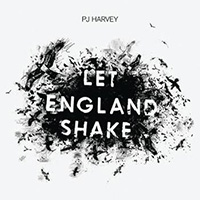
Let England Shake.
If you had to sum up PJ Harvey’s epochal tenth album Let England Shake in just one word, it would be this one: war. War, in all its morbid grandeur, in all its annihilating destruction, in all its breath-taking, fearful majesty—that is the fuelling reflection behind this modern masterpiece. Misty guitars serve as a glorious background for the 41-year-old singer-songwriter’s quivery-voiced contemplations about England, and the ravages of war that it has experienced. Nowhere is this more evident than on the frank ‘The Last Living Rose’ (“Goddamn Europeans! Take me back to beautiful England / And the grey damp filthiness of ages and battered books,” she wails). The best thing about PJ Harvey is her ability to make perfectly accessible music with your full knowledge that this isn’t what you’d usually consider ‘perfectly accessible’. For example, listen to her eerie paean ‘England’ and tell me that you don’t feel shivers down your spine and a displaced, bittersweet love for England at the same time. Her music’s enigmatic, intelligent and complex; but it’s also the same enigma that makes you stay, and even come back. Let England Shake finds this two-time Mercury Prize-winning Dorset native at the zenith of her talents. For a debut album or a sophomore album, that’s a pretty good accomplishment for an artist. But for a tenth album, it’s spectacular.
Notable songs: ‘The Last Living Rose’, ‘On Battleship Hill’, ‘England’.
Laura Marling
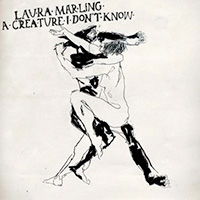
A Creature I Don’t Know.
At twenty-one years of age, Britain’s darling songstress Laura Marling has three critically acclaimed albums under her belt, and the adoration of millions in her home country. That kind of fame does not come without reason—and Ms. Marling certainly has plenty of reason. Unhindered by genres, Laura Marling makes music of zigzagging styles and widely varying emotions with only one thing in common: her ethereally gifted voice. On A Creature I Don’t Know, she has created a storybook album that takes you down a winding, Lynchian road filled with her obsession, regret, hate and crushing love for the Beast—an ambiguous being that could be herself, an ex, an abusive lover, or even an abstract idea. This is the kind of album that is underrated despite its overwhelming talent; its startling emotional depth makes sure of that. But if you give it an honest shot, you’ll find that, much like the singers of yesteryear, Laura Marling really can take your breath away and get under your skin, with the sheer intensity of her talent alone. (Click here to read our full review.)
Notable songs: ‘Night After Night’, ‘The Beast’, ‘Salinas’.
Lupe Fiasco
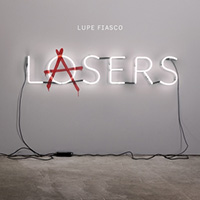
Lasers.
The critical reception to Lupe Fiasco’s third studio album Lasers makes one realise a depressing fact about modern music: that critics around the world are willing to make a place in their cynical hearts for commercial ‘music artists’; and in the same breath, they mercilessly bash into pulp skilled performers like Lupe Fiasco. I mean, sure, Lasers is not Goblin: you won’t find horrifically sinister material that pushes scary boundaries. And sure, Lasers is not The Adventures of Bobby Ray: Lupe has not sold his soul to the radio stations and the record executives that holistically.
Sometimes, his songs are radio-friendly (a ‘con’ for the Pitchfork-reading hipster in all of us). Sometimes, his songs don’t say as much as they should. Despite all that, Lasers has some of the most enjoyable songs of the year. ‘The Show Goes On’ makes one of the most brilliant uses of Modest Mouse’s ‘Float On’ ever, as Lupe tells his version of the timeless record-label-versus-artist story. ‘All Black Everything’ is about a parallel-universe, African-American-centric dream world that contains several imaginative, notable lines. (“Malcolm Little dies as an old man, Martin Luther King read the eulogy for him / Followed by Bill O’Reilly who read from the Quran” goes one part of the song; “The Rat Pack was cool group of black men / That inspired five white guys called The Jacksons,” goes another.) That’s the thing about Lasers: it’s really just an earnest rap record by an honest guy with whip-sharp, bouncy-cool flow, and an ear for bright, polished arrangements. If you’d rather listen to Bruno Mars, that’s your choice.
Notable songs: ‘The Show Goes On’, ‘Words I Never Said’, ‘All Black Everything’.








